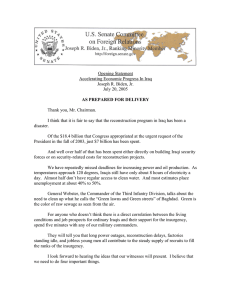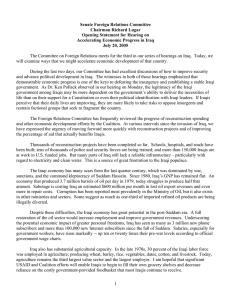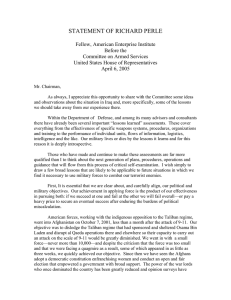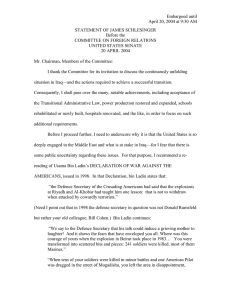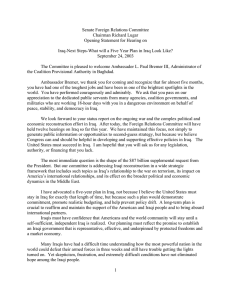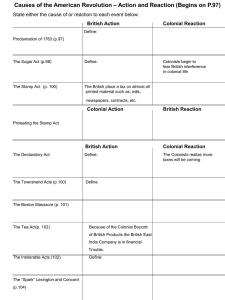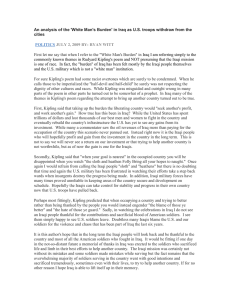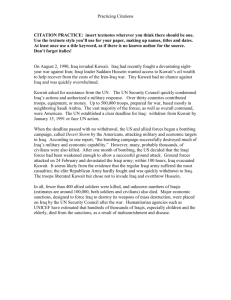Statement by Dr. Isam al Khafaji September 24 , 2003
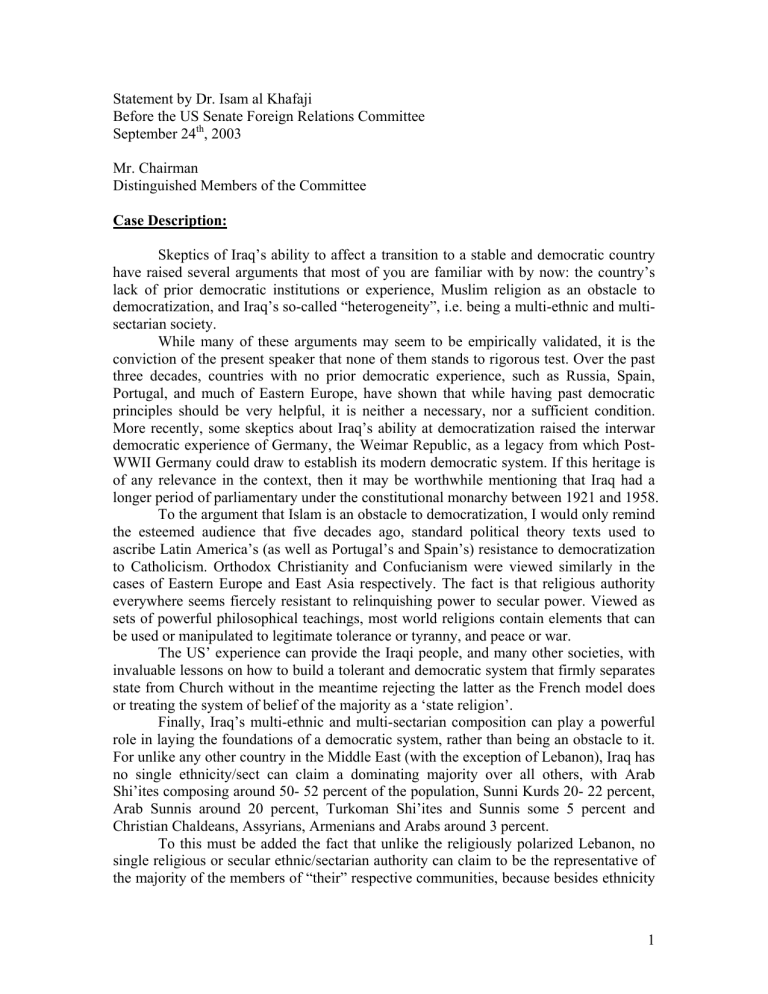
Statement by Dr. Isam al Khafaji
Before the US Senate Foreign Relations Committee
September 24 th
, 2003
Mr. Chairman
Distinguished Members of the Committee
Case Description:
Skeptics of Iraq’s ability to affect a transition to a stable and democratic country have raised several arguments that most of you are familiar with by now: the country’s lack of prior democratic institutions or experience, Muslim religion as an obstacle to democratization, and Iraq’s so-called “heterogeneity”, i.e. being a multi-ethnic and multisectarian society.
While many of these arguments may seem to be empirically validated, it is the conviction of the present speaker that none of them stands to rigorous test. Over the past three decades, countries with no prior democratic experience, such as Russia, Spain,
Portugal, and much of Eastern Europe, have shown that while having past democratic principles should be very helpful, it is neither a necessary, nor a sufficient condition.
More recently, some skeptics about Iraq’s ability at democratization raised the interwar democratic experience of Germany, the Weimar Republic, as a legacy from which Post-
WWII Germany could draw to establish its modern democratic system. If this heritage is of any relevance in the context, then it may be worthwhile mentioning that Iraq had a longer period of parliamentary under the constitutional monarchy between 1921 and 1958.
To the argument that Islam is an obstacle to democratization, I would only remind the esteemed audience that five decades ago, standard political theory texts used to ascribe Latin America’s (as well as Portugal’s and Spain’s) resistance to democratization to Catholicism. Orthodox Christianity and Confucianism were viewed similarly in the cases of Eastern Europe and East Asia respectively. The fact is that religious authority everywhere seems fiercely resistant to relinquishing power to secular power. Viewed as sets of powerful philosophical teachings, most world religions contain elements that can be used or manipulated to legitimate tolerance or tyranny, and peace or war.
The US’ experience can provide the Iraqi people, and many other societies, with invaluable lessons on how to build a tolerant and democratic system that firmly separates state from Church without in the meantime rejecting the latter as the French model does or treating the system of belief of the majority as a ‘state religion’.
Finally, Iraq’s multi-ethnic and multi-sectarian composition can play a powerful role in laying the foundations of a democratic system, rather than being an obstacle to it.
For unlike any other country in the Middle East (with the exception of Lebanon), Iraq has no single ethnicity/sect can claim a dominating majority over all others, with Arab
Shi’ites composing around 50- 52 percent of the population, Sunni Kurds 20- 22 percent,
Arab Sunnis around 20 percent, Turkoman Shi’ites and Sunnis some 5 percent and
Christian Chaldeans, Assyrians, Armenians and Arabs around 3 percent.
To this must be added the fact that unlike the religiously polarized Lebanon, no single religious or secular ethnic/sectarian authority can claim to be the representative of the majority of the members of “their” respective communities, because besides ethnicity
1
and religion, loyalties in a complex and highly urbanized society like Iraq are formed along regional, professional and ideological lines.
Rather than viewing this situation as disruptive, this state of affairs means that unlike Iran or Saudi Arabia, no single community or ideology in Iraq can impose its tyranny in the name of representing the majority.
Describing the Problem:
The above description is not intended to draw a rosy picture of a situation that is far from ideal. It is rather intended to direct your attention to what I think is the sources of the lack of a consensus among Iraqis. And once again, it is from the US experience, as well as from those of others, that we learn that before or alongside the establishment of diversity and pluralism, no democracy can survive without a social contract which stipulates what unites the diversity and from which common rules and laws can be drawn.
The Ba’thist regime has forcibly imposed a destructive concept of unity among
Iraqis which sought, and succeeded to a certain extent to atomize the population and linking the individuals directly to the state. During the rising days of that regime, until circa the mid 1980s, this concept tried to impose homogeneity on the population by marginalizing and suppressing entire communities and regions. This could not have been made possible without the tremendous resources that accrued to the Iraqi state thanks to the oil extraction sector whose revenue yielding potential had very little to do with the productive capacity of the people. A welfare state made of huge numbers of civil and military and paramilitary servants and a large stratum of wealthy businessmen living on state contracts that was handed according to political, family and clannish cronyism deprived Iraqis from any autonomy and enhanced a perception among them that the state does not owe anything to the people. Rather it was they who owed their living to the state.
Only after the Ba’thist state drained Iraq’s resources and had to withdraw from providing the basic social and economic services did atomized individuals turn back to revive their sub-national loyalties in search of protection and basic services.
Remedying the problem:
Iraqis cannot hope to reach a modern social contract without a long-term modernizing project aimed at engaging them in rebuilding their devastated economy and society. With the huge demands on the oil-revenue, the days of the parasitic welfare state are over, and it is would be very misleading and dangerous to revive any illusions among them on “oil funds” that would bring them toast and honey without hard work.
But before this reconstruction project can effectively roll on, security and the rule of law must be firmly established. And the Coalition Provisional Authority (CPA) is in a unique position to help us in establishing this complicated project by seriously revising some of its policies that sent a wrong message to the Iraqis and left them to question the sincerity of the claims to liberate them and putting their fates into their own hands.
A quick and systematic, but not hasty, process to ‘Iraqize’ the functions that the
CPA is performing now must begin by admitting that not only implementation of security policy should be handed to the Iraqis themselves, but also drawing and designing that policy, with the intensive help and advise of the Coalition forces. Foreign armed forces,
2
no matter how technologically advanced, can never bring security. Rather, their wellbeing and safety will become a security problem and a huge drain on the US budget which can only escalate with time.
The justifiable fears among US policymakers as well as among Iraqis that relying on militias and tribal chiefs in building and reorganizing a modern police and security force can lead to disruptive results can be overcome by empowering the already functioning provincial councils. These councils can draw from a huge pool of unemployed ex-soldiers and policemen by announcing a crash plan to recruit members of a national police force proportionate to the rough population of each governorate as a first step to merge these provincial police forces into one national police force. The names of the new applicants must be made public and citizens must be encouraged to object any of the applicants if they have sufficient evidence that he had been implicated in past violations of human rights.
Within a month time, the role of US forces can be transformed from confronting the population to monitoring the newly formed police force, training, educating and imposing discipline on them. The Coalition troops can be redeployed to safeguard Iraq’s borders, until an Iraqi army can stand on its feet.
Only when palpable achievements on the security front can be made, would the civil administration and economic enterprises be able to resume their normal functions, and a political process that would enable Iraq to regain its sovereignty, as a country in transition to democracy can be launched.
How long would this process take? A timetable of less than one year can ensure achieving the following functions:
The political process:
1.
Relying on the food for oil rationing cards, where all resident Iraqis were registered, a process for the election of a constituent assembly can
2.
3.
4.
be initiated and called for by the end of this timetable.
A national committee composed of official and non-governmental bodies can call on Iraqis in the Diaspora, to register in the Iraqi embassies and other centers to be established in the major centers where they cluster.
A constituent assembly would be elected in 6-7 months after the establishment of basic security. The role of this assembly is to approve a draft of a permanent constitution and to appoint a transitional government.
The legal basis along which Iraq is run until approving a permanent constitution is the interim constitution that was adopted following the
5.
1958 revolution.
The US, while recognizing the outcome of these elections and the ensuing government, will declare that it will keep a reduced military presence until a fully constitutional system is in place to negotiate and establish the future relationship between the US and Iraq.
Transitional Justice:
3
1.
2.
3.
4.
5.
Alongside the political process, a transitional justice system made up of reformed and reeducated Iraqi judges, Coalition advisors, and representatives of political parties and NGOs would be set up in each of Iraq’s governorates. All US prisoners of war would eventually be turned to these courts in order to try them.
An interim law on trying crimes committed by the Ba’thist regime can be worked out by representatives from the entities mentioned in the previous paragraph. As a starting point, the reports produced by the workshops on transitional justice in
2002 can be used.
The law must clearly state the nature of punishable crimes and the levels of punishment.
Prosecuted members would be declared ineligible for running to the election of the Constituent Assembly.
Citizens would be called upon to hand whatever information they may have on past crimes, and the acquisition by non judicial bodies of files and documents pertaining to the Ba’thist regime would be declared illegal.
Civil Service and Economic Decision making:
1.
The US must clearly and explicitly make its vision, objectives and goals regarding its economic relations with Iraq known to the Iraqi
2.
people.
To fill their promises of radically departing from past tyrannical practices, the US and any interim Iraqi body must refrain from approving laws or regulations that have long-term effects on the
3.
4.
structure of Iraqi society and economy without a transparent and accountable mechanism.
Iraqi business community and the relevant ministries and public bodies must be fully empowered to supervise, monitor and approve all reconstruction tenders.
The CPA should cede more authority to the proposed International
Advisory and Monitoring Board, which is composed of representatives from the World Bank, the IMF, the UN and the Arab development fund.
In the meantime, an extremely positive message can be made if the US, through the CPA, champions the cause of involving Iraqis as full and observer members of this board.
4


